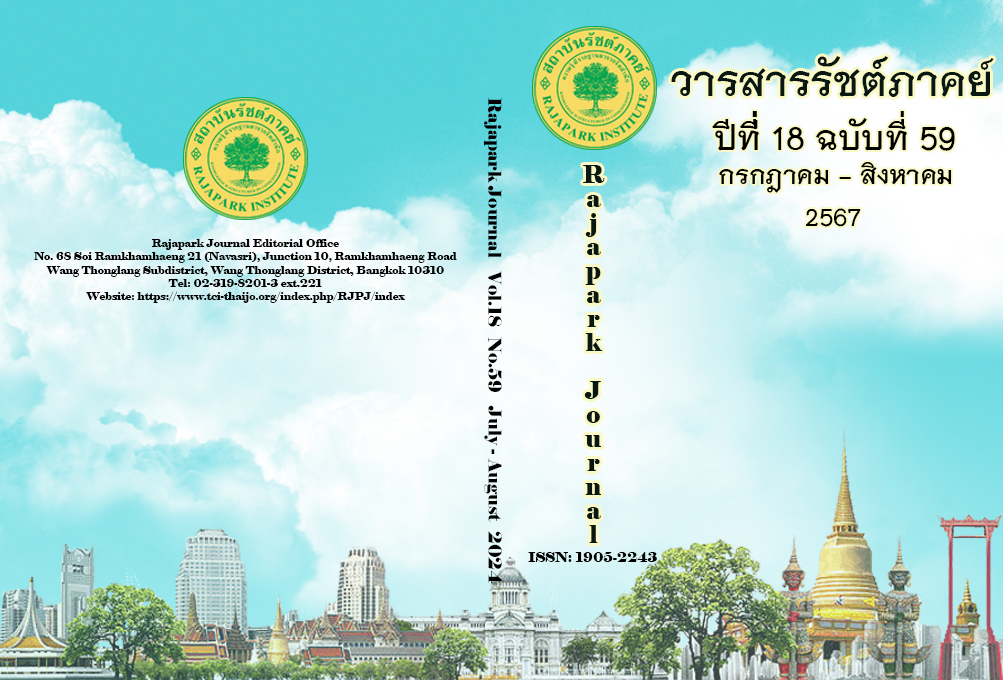Development the Ability to Create Stories and Puppets for Early Childhood Education Students Using STEM Education Concepts
Main Article Content
Abstract
This research is quasi-experimental research conducted with multiple data collections over different periods, employing a One Group Time-Series Design. The objectives were to 1) determine the effectiveness of the STEM education-based learning management plan, 2) compare students' abilities in stories and puppet creation before and after receiving STEM education-based learning management, and 3) investigate students' satisfaction with STEM education-based learning management. Participant was obtained through simple random sampling, using classes as the sampling units. The research instruments included: 1) a STEM education-based learning management plan for the subject of storytelling and puppetry for early childhood, 2) an assessment form for the ability to create stories and puppets for early childhood, and 3) a satisfaction assessment form for STEM education-based learning management. Data were analyzed using mean, standard deviation, and t-test for dependent samples. The research findings are as follows: 1) the effectiveness index of the learning management plan is 76.80%, 2) students' abilities in stories and puppet creation after receiving STEM education-based learning management are significantly higher than before at the .05 level (Z=416, p < .001), and 3) the overall satisfaction with STEM education-based learning management is at the highest level (x = 4.66, SD = 0.45).
Article Details

This work is licensed under a Creative Commons Attribution-NonCommercial-NoDerivatives 4.0 International License.
Views and opinions appearing in the Journal it is the responsibility of the author of the article, and does not constitute the view and responsibility of the editorial team.
References
Baharin, N., Kamarudin, N., & Manaf, U. K. A. (2018). Integrating STEM education approach in enhancing higher order thinking skills. International Journal of Academic Research in Business and Social Sciences, 8(7), 810-822. DOI:10.6007/IJARBSS/v8-i7/4421
Booncherd, J., & Keeratichamroen, W. (2020). A study of learning achievement in social studies and media literacy abilities of grade 10 students using problem-based learning. NRRU Community Research Journal, 14(4), 251-263. https://so04.tci-thaijo.org/index.php /NRRU/article/view/243929
Breiner, J. M., Carla, C. J., Harkness, S. S., & Koehler, C. M. (2012). What is STEM? A discussion about conceptions of STEM in education and Shelly Sheats Harkness Partnerships. School Science and Mathematics, 112, 3-11. https://doi.org/10.1111/j.1949-8594.2011.00109.x
Bybee, R. W. (2013). The case for STEM education: Challenges and opportunities. National Science Teachers Association: NSTA. https://static.nsta.org/pdfs/samples/PB337Xweb.pdf
Carlisle, D. L., & Weaver, G. C. (2018). STEM education centers: Catalyzing the improvement of undergraduate STEM education. International Journal of STEM Education, 5, 47. https://doi.org/10.1186/s40594-018-0143-2
Chatraphorn, P. et al. (2008). Time changed...Your physics score changer...Who did this? (1st year university physics results during the change in university admissions system). Thai Physics Journal, 25(3), 19-24.
Dejarnette, N. K. (2012). America’s children: Providing early exposure to STEM (Science, Technology, Engineering and Math) initiatives. Education, 133(1), 77–84. https://eric.ed.gov/?id=EJ996974
Institute for the Promotion of Teaching Science and Technology. (2014). STEM education. Institute for the Promotion of Teaching Science and Technology.
Intalapaporn, C., Patphol, M., Wongyai, W., & Pumsa-ard, S. (2015). The study guidelines for learning management of the STEM Education for elementary students. Veridian E-Journal, Silpakorn University (Humanities, Social Sciences and Arts), 8(1), 62-74. https://he02.tci-thaijo.org/index.php/Veridian-E-Journal/article/view/29290
Kaewpikul, J. (2011), The Effect of 7E Learning Model on Academic Achievements and Retention of 6th Grade Science and Technology Course Students in the Unit Electricity in Our Life. Thai Science Education, 10(3), 93.
Kaleci, D., & Korkmaz, O. (2018). STEM Education Research: Content Analysis. Universal Journal of Educational Research, 6(11), 2404 - 2412.
Kheatprawat, K. (1999). General teaching methods and teaching skills. Watthanapanit.
Kongsanoe, S. (2562, January). STEM Education. National Assembly Library of Thailand. https://library.parliament.go.th/th/radioscript/saetmsueksa-stem-education
Nidyaprapa, P. (2021). Production of children's books. Odeon Store.
Office of the Secretariat of the Education Council. (2016). Research report to prepare policy proposals for promoting STEM education in Thailand. Phrikwarn Graphic.
Samahito, C. (2014). The Science, Technology, Engineering, and Mathematics Activity Provision for Young Children. In Paper presented at the Pre-School Education Association of Thailand. January 25, 2014. Bangkok, Pre-School Education Association of Thailand.
Shilds. (2006). Science, technology, engineering, and mathematics education. In Paper presented at STEM Workshop. The Institute for the Promotion of Teaching Science and Technology.
Siriphattrachai, P. (2013). STEM education and 21st century skills development. Executive Journal, 33(2), 49-56. https://so01.tci- thaijo.org/index.php/executivejournal/article/view/80766
Sirila, P. (2022). The results of learning management using phenomena as a basis to integrate STEM concepts to develop applied thinking for elementary school students[Master’s thesis, Chulalongkorn University].
Sribua, W. (2017). Stories and puppets for early childhood children. Department of Early Childhood Education, Faculty of Education, UdonThani Rajabhat University.
Srisa-ard, B. (2013). Preliminary research (9th ed.). Suwiriyasarn.
Stohlmann, M., Moore, T. J., & Roehrig, G. H. (2012). Considerations for teaching integrated STEM education. Journal of Pre-College Engineering Education Research (J-PEER), 2(1), 28-34.
Thananuwong, R. (2013). Proceeding STEM education. http://www.slideshare.net/focusphysics/stem-workshop-summary
Tejagupta, C. et al. (2017). Psychology and learning methodology. STOU Press.
Tunjitranon, P., & Junoisuwan, P. (2013). Enhancing STEM problem-solving skills of undergraduate students by using the integrated STEM education with argumentation learning model (6E+A). Journal of MCU Nakhondhat, 6(10), 5179-5192.
https://so03.tcithaijo.org/index.php/JMND/article/view/227488
Tumnongdee, K. (2012). Effects of learning with the bilingual Aesop's Fables e-book on listening and reading comprehension of early childhood children[Master’s thesis, Rajamangala University of Technology Thanyaburi].
Wayne, C. (2012). What is S.T.E.M. and why do I need to know?. http://issuu.com/carleygroup/docs/stem12online/1
Zhai, L. (2019). An inquiry teaching mode based on STEM education. International Journal of Emerging Technologies in Learning (iJET), 14(17), 44–58. https://doi.org/10.3991/ijet.v14i17.11204


